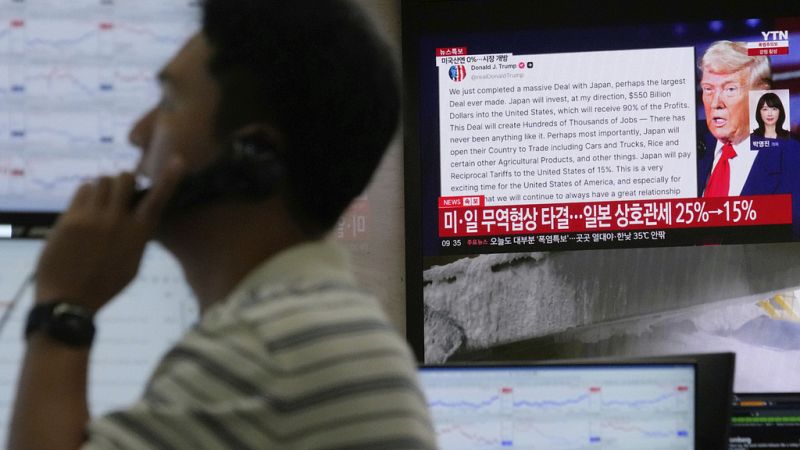Asian Markets Soar as Toyota Gains 14% on U.S. Tariff Deal

US and Japan Reach Trade Agreement, Boosting Asian Markets
The United States, the world's largest economy, and Japan, the fourth-largest, have reached a significant trade agreement that has sent ripples through Asian financial markets. This deal is expected to lead to lower tariffs on Japanese goods entering the U.S., with carmakers being among the biggest beneficiaries.
Under the new agreement, a 15% import duty will be applied to most Japanese goods, excluding specific items like steel and aluminum, which are subject to higher tariffs. This is a reduction from the 25% tariff that former President Donald Trump had threatened to impose on August 1 if no deal was reached. The adjustment has sparked optimism among investors, leading to sharp gains in several major Asian stock indices.
Tokyo’s Nikkei stock index saw a rise of nearly 3.9% in early trading, while the Asia Dow increased by 2.7%. Hong Kong’s Hang Seng jumped 1.3%, and the Shanghai Composite gained 0.4%. These movements reflect growing confidence in the potential economic benefits of the agreement.
Automotive Sector Benefits from Reduced Tariffs
One of the key areas where the deal is expected to have a significant impact is the automotive sector. Reports suggest that Japanese car exports to the U.S. may face lower tariffs than other global competitors. According to Japanese broadcaster NHK, the overall tariff rate on automobiles could be set at 15%. This would replace the current 25% tariff plus an additional 2.5% duty on all imported cars.
This development has been met with enthusiasm from investors, who see it as a positive sign for major Japanese automakers. Toyota’s shares surged over 14.3%, Honda’s climbed more than 11.1%, and Nissan saw gains of nearly 8.3% by the close of Asian trading. Despite this, Japanese automakers have remained largely silent on the matter, a common practice in the country due to their cautious approach to public statements.
Uncertainty Surrounds Key Details
While the agreement is seen as a win for both sides, some details remain unclear. Japanese business officials have expressed concerns about the unpredictability of former President Trump’s policies, with some choosing not to comment publicly due to his history of changing positions on trade issues.
President Trump highlighted the deal on his social media platform, claiming it would create "hundreds of thousands of jobs." He also noted that Japan is investing $550 billion (€468.7 billion) into the U.S. at his direction and that Japan will open its economy to American autos and rice. Japanese Prime Minister Shigeru Ishiba welcomed the agreement, calling it beneficial for both nations.
Market Reactions in the U.S.
In the U.S., the stock market continued its upward trend, with the S&P 500 hitting another record high. The Dow Jones Industrial Average rose 0.4%, while the Nasdaq Composite dipped slightly. Meanwhile, U.S. Treasury yields fell as traders anticipated a delay in the Federal Reserve’s interest rate cuts, with September now seen as the earliest possible date for any action.
Crude oil prices also saw some movement, with U.S. benchmark WTI crude falling nearly 1.5% to $65.22 per barrel. Brent crude dropped slightly to $68.54. In currency markets, the U.S. dollar strengthened against the Japanese yen and the euro.
Ongoing Trade Negotiations
As the U.S. continues to navigate its trade policy, discussions with other countries are ongoing. The next major deadline is August 1, with potential deals aimed at mitigating the impact of proposed tariffs. Analysts believe that recent trade agreements with Japan and the Philippines have helped maintain positive market sentiment, even as negotiations with the EU and South Korea remain unresolved.
Overall, the U.S.-Japan trade deal has provided a boost to Asian markets and signaled a shift in trade relations between two of the world’s largest economies. As the situation evolves, further developments will likely shape the future of global trade dynamics.